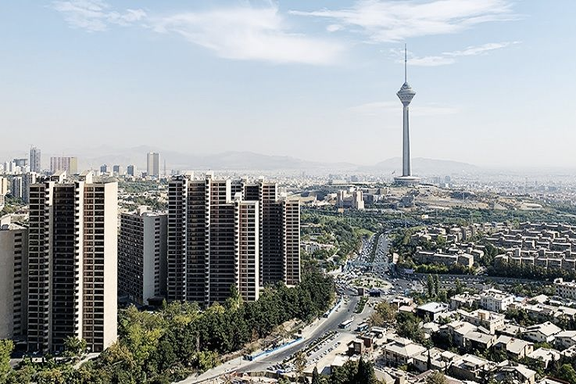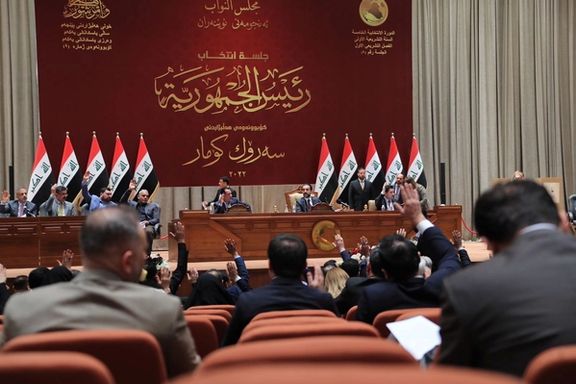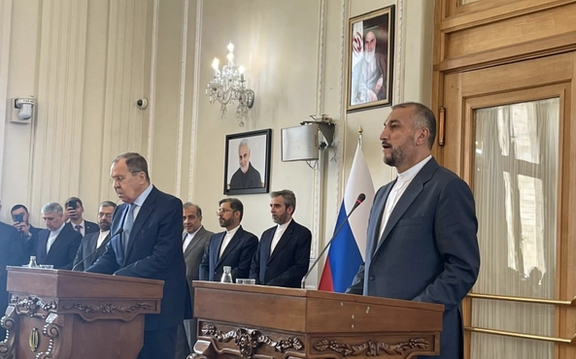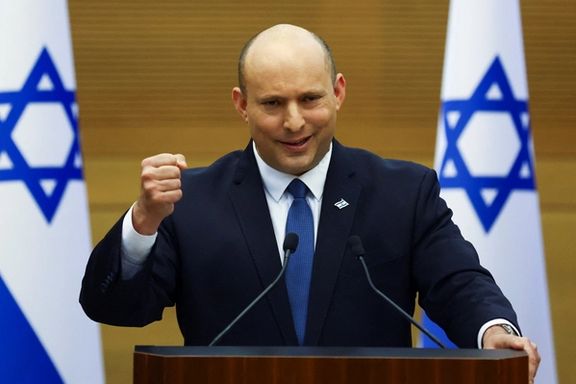Tehran Among Least Liveable Cities In The World, Study Reveals

According to an annual report from the Economist, Tehran is among the bottom ten cities in the ranking of 173 cities in terms of the Global Liveability Index.

According to an annual report from the Economist, Tehran is among the bottom ten cities in the ranking of 173 cities in terms of the Global Liveability Index.
In the report published by the Economist intelligence unit -- the research and analysis division of The Economist -- on Thursday, Tehran is at the 163rd place of the list that quantifies the challenges to an individual's lifestyle in cities worldwide.
The study reviewed and assessed 173 cities across five broad categories of stability, healthcare, culture and environment, education and infrastructure.
In terms of stability and infrastructure, Tehran is worse than Douala in Cameroon, although in overall average Iran is one place higher. Considering culture and environment, Tehran is even worse than Libya’s Tripoli, Nigeria’s Lagos, and Syria’s Damascus, which are at the rock-bottom of the rankings.
The only category that saved Iran from languishing at the very bottom is healthcare that has 20 percent weight in the total score, but a closer look at the category reveals that the quality and availability of private healthcare is the decisive factor in the index. Tehran does have private health care but it is not affordable for ordinary Iranians, who are struggling to make ends meet due to above-50-percent inflation.
The Austrian capital, Vienna, has made a comeback as the world’s most liveable city as a rollback of covid-19 restrictions has translated into rankings resembling those seen before the pandemic. It is followed by Copenhagen in Denmark and Switzerland’s Zurich.

About two weeks after the mass resignation of the Sadrist bloc, Iraq's parliament swore in dozens of new lawmakers on Thursday, giving majority to Iran-backed politicians in the assembly.
A group of 73 parliamentarians loyal to the powerful Shiite cleric Moqtada al-Sadr resigned on June 12 upon his order after eight months of stalemate over forming a new government. Addition of the 64 new representatives means the influence of the parties supported by the Islamic Republic of Iran in the Iraqi parliament increased and they once again became the main force in the 329-seat parliament. Nine newly elected representatives were absent for unknown reasons.
"Following the Sadr lawmakers' resignation, we can confirm that we are the largest bloc in parliament with around 130 seats after the swearing in of the new lawmakers," Shiite lawmaker Ahmed Rubaie told reporters.
Sadr's party was the biggest winner in an October general election, and its success had raised the possibility that he could sideline his Iranian-backed rivals who had dominated politics in Iraq for years, but political disagreement among parties hindered parliament from electing a president and forming a government.
Sadr said on Wednesday that his decision to withdraw from Iraqi politics was prompted by pressure exerted by Iranian proxies on non-Shia members of his parliamentary coalition and on the Iraqi judiciary, but dismissed rumors that Iran itself had pressured him directly. “Iran this time did not exert any pressure on any Shiite party.”
Last week, Foreign Minister Fuad Hussein criticized Iran's interference in Iraq's internal affairs.

Hosting Russian counterpart Sergei Lavrov, Foreign Minister Hossein Amir-Abdollahian reiterated Thursday Iran’s support for a diplomatic end to the Ukraine war.
Amir-Abdollahian was speaking at a press conference alongside Lavrov, who arrived in Iran Wednesday on a two-day visit that appears to bring Moscow and Tehran closer. Talks have reportedly covered the 2015 Iran nuclear deal and boosting bilateral trade as the fall-out from Ukraine continues.
“We believe that American actions done through NATO are part of the crisis' causes,” Amir-Abdollahian said. “However, the Islamic Republic does not see war as a solution and welcomes political talks…”
Lavrov stressed the importance of adding “depth” to the “height” of existing Iran-Russia relations, and suggested “experts” should work on “ways to substantiate” the 20-year cooperation agreement in principle reached February, which some Iranian analysts argue has yielded few benefits. The Russian foreign minister also made an oblique remark on extending “the protection of intelligence,” probably referring to enhanced security cooperation.
‘Correct understanding’
The Russian foreign minister said he agreed with sentiments over Ukraine expressed Wednesday by President Ebrahim Raisi, who had warned of the necessity of being “active in the face of attempts to expand NATO’s influence in any part of the world, including in West Asia, the Caucasus and Central Asia.” Lavrov thanked Iran “for his correct understanding of the roots of this problem.”
While Russia, alongside China, voted against the June 8 resolution critical of Iran raised by the United States and three European states at the International Atomic Energy Agency (IAEA), Moscow’s efforts to discount exports – especially oil and steel– can have adverse consequences for Iran, including cutting its competitiveness in supplying China.
But any new pattern is unclear. According to Petro-Logistics, the oil trade analysts, Iran’s oil exports jumped from an average 461,000 barrels per day in May to 961,000 between June 1 and June 19. China has been easily Iran’s main crude market since the US in 2018 imposed ‘maximum pressure’ sanctions, threatening punitive action against third parties, when Washington left the 2015 nuclear deal, the Joint Comprehensive Plan of Action (JCPOA).
Reuters reported June 22 the arrival in China of a shipment of 2 million barrels of Iranian oil. Most of the latest cargoes, it said, were for state reserves and not, as had previously often been the case, purchases by small, independent refineries.
India’s ‘independent’ approach
Prior to receiving Lavrov in Tehran, Amir-Abdollahian June 8-10 visited India, which has not only resisted US and European calls to boycott Russian oil exports but increased its purchases to the extent Moscow became last month its second largest crude supplier, after Iraq.
Some analysts in India have welcomed the ‘independent’ approach of Prime Minister Narendra Modi, comparing it favorably with New Delhi’s decision in 2007 under US pressurenot to go ahead with a gas pipeline from Iran, a move that followed India voting at the IAEA in 2005 to refer Iran to the United Nations Security Council. India abstained on the June 8 vote censuring Iran at the IAEA governing board.
During Abdollahian’s visit, India’s Prime Minister Narenda Modi tweeted June 8, the day of the IAEA censure resolution: “Our relations [with Iran] have mutually benefited both the countries and have promoted regional security and prosperity.”
While Russia-India trade was around $13 billion in 2021, small relative to Moscow’s $750-billion trade with the European Union, some Russian analysts argue it will now increase rapidly and that projections of $30 billion by 2015 need upward revision. And while Iran’s small trade with Russia, though expanding, is unlikely to even come close to $25 billion by 2025, another aspect of post-Ukraine realignment may be Iran’s increasing role as trading hub between Russiaand its Asian markets, especially India.

IRGC-linked news agencies have reported that the Guards' counter-intelligence chief Mohammad Kazemi has replaced Hossein Taeb as the IRGC's intelligence chief.
Tasnim quoted IRGC's Public Relations spokesman Ramazan Sharif as saying that IRGC Commander Hossein Salami has appointed Kazemi as the IRGC's new intelligence chief on Thursday, June 23.
IRGC social media outlets Wednesday night ended nearly two days of rumors about the "dismissal" of Taeb, announcing that he has been removed from his post, but he will be appointed to a higher position.
Sharif told Tasnim that Hossein Taeb has been appointed as an "adviser" to the IRGC commander, a clear sign that the former intelligence chief has been demoted. Meanwhile, the fact that Taeb's removal and Kazemi's appointment is announced by a low-key IRGC officer rather than Supreme Leader Ali Khamenei who directly oversees the IRGC Intelligence is another indication that Taeb has been dismissed from his job.
Tasnim placed the news about Taeb under its top story which is about Lavrov's visit in an elaborate attempt to downplay the development. The report's headline is also about Kazemi's appointment rather than Taeb's removal.
In recent weeks there were multiple mysterious incidents in which IRGC officers and operatives were killed or died in unexplained circumstances. Iran blamed Israel for some of the incidents.
According to Sharif, Kazermi has been the IRGC Intelligence Organization's counter-intelligence chief for many years and is highly experienced in intelligence and security matters. Kazemi is a brigadier general while Taeb was a cleric with some military experience that dated back to the 1980s war with Iraq.
According to political analyst Morteza Kazemian, Taeb, one of the most feared men in Iran's security system, was the second strongest man in the country's intelligence system only after Khamenei. Kazemian added that Taeb maintained good relations with Khamenei's son Mojtaba, a former comrade during the war.
Meanwhile, Kazemian suggested that Russian Foreign Minister Sergey Lavrov visiting Tehran on Thursday, possibly carried a message that revealed flaws in Taeb's performance. In a press conference in Tehran Lavrov Thuesday did refer to an "intelligence protection agreement|" with Tehran, wihtout elaboration.
Taeb was recently harshly criticized by social media activists and some politicians for failing to detect and prevent Israel's destructive operations in Iran.
Social media activists also said that the change on top of the IRGC Intelligence Organization revealed a divide in the organization that was already noticed after several leaks. On the other hand, the fact that an Israeli news outlet, Kaan News reported Taeb's removal from his post several days before its confirmation by Iranian officials, was another indication that Israel had access to insider information from the IRGC Intelligence Organization.
Furthermore, the choice of the new chief from the counter-intelligence unit, points out the fact that the reason for the change was something happening within the organization where Kazemi was in a better position to detect the leaks.
Social media activist and war veteran Hadi Mehrani said in a tweet that the change will have major repercussions and significant events are likely to take place in Iran.
The spokesman for Iran's Reform Front, Ali Shakouri Rad also said in a tweet on the same date that: Taeb's removal is a very important development which requires to be elaborated as the organization has a major role in elections and the running of the affairs of the state in Iran."

Prime Minister Naftali Bennett says the Islamic Republic will pay the price of targeting and threatening Israel on its own territory, implicitly confirming Israel’s role in the assassinations of IRGC officers.
During an interview with a New York Times columnist on June 21, Bennett said when Iranians “hit us through proxies or directly, they will pay a price in Iran.”
Describing what he calls his “Octopus doctrine,” he said Israel hits Tehran at the head of the octopus rather than its tentacles that have spread across the region.
Bennett added, “It turns out these guys are more vulnerable than they seem. The Iranian regime is rotten, corrupt — and incompetent.”
Bennet accused Tehran of “violating fundamental requirements” of the Nuclear Nonproliferation Treaty and seeking to strike Israel directly using unmanned aerial vehicle.
Late in May, the New York Times quoted an Israeli intelligence official as saying that Tel Aviv has informed American officials it was responsible for the killing of Colonel Hassan Sayyad-Khodaei -- a member of IRGC’ Quds Force in Tehran, adding that the Israelis killed him as a warning to Iran to halt the operations of a covert group within the Quds Force known as Unit 840, tasked with abductions and assassinations of foreigners around the world, including Israeli civilians and officials. Israel later denied the country took responsibility for the assassination.

A court in Iran has found the US government and many ex-officials responsible for the killing of Iranian nuclear scientists and demanded monetary compensation.
Iran’s High Council for Human Rights, which is part of the international affairs department of the judiciary, said on Thursday that the verdict was issued by Branch 55 of the Tehran Legal Court over Washington’s violations of international obligations through its support and assistance for Israel in committing “terrorist acts against nuclear scientists.”
IRNA said the lawsuit was filed by “the martyrs' families” over the physical, psychological and financial damage that they endured due to the killings.
According to the court ruling, $2.150 billion was due to the material and moral damages inflicted on the plaintiffs, and the same amount has been considered as punitive measures. The ruling, as reported by state media did not name the plaintiffs.
The move can be a belated reaction to many civil lawsuits in the United States seeking damages for Iran by those whose family members were killed in various acts of political violence, in which Iran had a direct or alleged role.
Until 2016, US courts had awarded plaintiffs a total of $56 billion to be paid by Iran or Iranian entities. A few more billions of dollars have been awarded since 2016.
Some have argued, that this large amounts of pending judgements against Iran is a factor in Iran’s calculations to reach a nuclear agreement to lift US sanctions. The monetary judgements could be a factor in deterring companies from investing in Iran or doing business with it even after sanctions would be lifted.
The defendants in the case are 37 American individuals and entities, including the US government, the State Department, the Department of Defense, the US National Security Agency, former presidents Barack Obama and Donald Trump, former Secretary of State Mike Pompeo, former Assistant Secretary of State Brian Hook, and former Secretary of Defense Ashton B. Carter.
But the defendants have no assets under Iranian jurisdiction to be seized, and the move by the Tehran court, under the government’s political control, could be a bargaining ploy or simply a propaganda act for domestic audiences.
The US has played an effective role in “establishing, strengthening and supporting Israel as a terrorist regime,” and each year donates hundreds of millions of dollars in direct economic and military support to the regime, the court ruling read.
Over the past years, several Iranian nuclear scientists have been the target of assassinations, which Iran blames on Israel. Between 2010 and 2012, four Iranian nuclear scientists — Masoud Alimohammadi, Majid Shahriari, Darioush Rezaeinejad and Ahmadi Roshan — were assassinated, while another, Fereydoon Abbasi, was wounded in an attempted murder. Roshan was the head of a department at the Natanz nuclear facility and was assassinated by a magnetic bomb.
In the latest case, Iran blamed Israel for the assassination of Mohsen Fakhrizadeh, said to be Iran’s top nuclear man, in November 2020 in a highly complicated operation east of the capital Tehran involving a remote-controlled one-ton automated weapon that had been smuggled into the country in pieces.
Iran has also accused Israel of sabotage operations against its nuclear facilities including an explosion in April 2021 that inflicted major damage to the Natanz uranium enrichment site.
Israel has never officially taken responsibility for any of these assassinations and sabotage operations but also has never denied involvement.